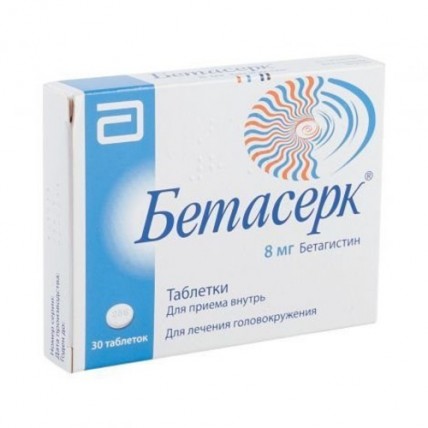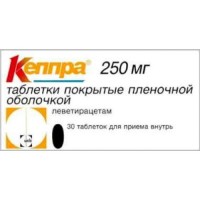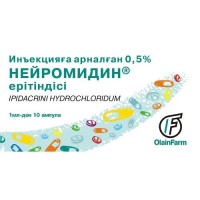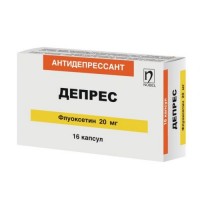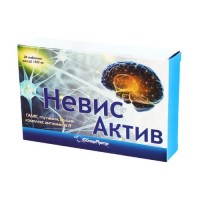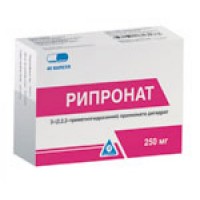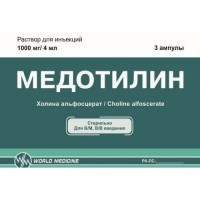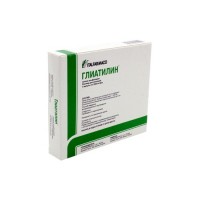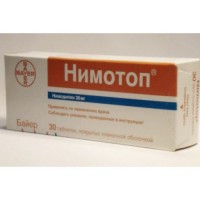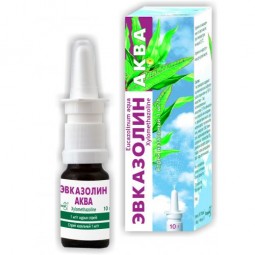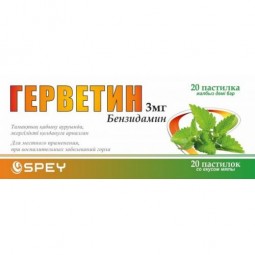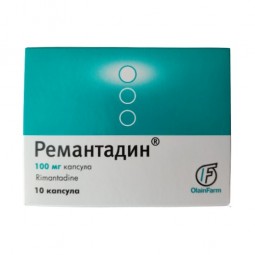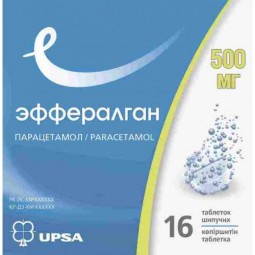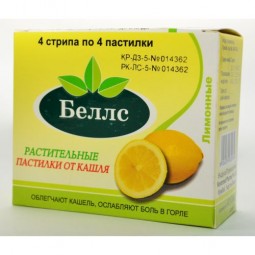Betaserc® (Betahistine Dihydrochloride) 8 mg, 30 tablets
- $27.30
The instruction for medical use of Betaserk® medicine the Trade name of Betaserk® the International unlicensed name Betagistin Lekarstvennaya a form of the Tablet of 8 mg, 16 mg and 24 mg Structure One tablet contains active agent – a betagistin dihydrochloride of 8 mg, either 16 mg, or 24 mg, excipients: microcrystalline cellulose, Mannitolum, citric acid monohydrate, silicon dioxide colloidal anhydrous, talc. The description of the Tablet of round shape, with a flat surface, from white till almost white color, with a facet, with the inscription 256 on one party (for a dosage of 8 mg). Tablets of round shape, with a biconvex surface, from white till almost white color, with the facet risky on one party and the inscription 267 on both sides from risks (for a dosage of 16 mg). The tablet is divided into two equal half. Tablets of round shape, with a biconvex surface, from white till almost white color, with the facet risky on one party and the inscription 289 on both sides from risks (for a dosage of 24 mg). Dividing risk it is intended for a tablet razlamyvaniye for the purpose of swallowing simplification, but not for division into two equal doses. Pharmacotherapeutic group of Means for elimination of dizziness. Betagistin. The ATX N07CA01 code the Pharmacological Pharmacokinetics At properties intake betagistin is soaked up from digestive tract and metabolized quickly and almost completely. The main metabolite – 2-PAA (2-pyridylacetic acid) which has no pharmacological activity. Levels of a betagistin in plasma very low. Therefore all pharmacokinetic analysis is based on determination of level 2-PAA in blood plasma and urine. The maximum concentration 2-PAA at Betaserk's reception together with food below, than at reception on an empty stomach. However meal does not influence extent of absorption of a betagistin, and only slows down it as the indicator of the general absorption is identical under both conditions. Extent of linking of a betagistin with blood plasma proteins less than 5%. The maximum concentration 2-PAA in blood plasma is reached in 1 hour after Betaserk's reception. Elimination half-life about 3.5 hours. 2-PAA it is quickly removed by kidneys. In the range of doses between 8 and 48 mg about 85% of the entered dose are removed with urine. A renal or fecal way of excretion of a betagistin have small value. Clearance rate which remains to a constant at intake of a dose of a betagistin from 8 to 48 mg indicates the linear nature of its pharmacokinetics and that the involved ways of metabolism are not saturated. A pharmacodynamics the Mechanism of action of a betagistin is studied insufficiently. There are several convincing hypotheses which are confirmed by data of clinical and preclinical trials. Betagistin influences a gistaminergichesky system: In biochemical researches it is established what betagistin is weak N1-agonist and the strong antagonist of H3 receptors as in tissue of nervous system and has practically no affinity to H2 receptors. Бетасерк® increases development and emission of a histamine by means of blocking presynaptic H3 receptors and also reducing quantity of H3 receptors. Betagistin improves microcirculation both in cochlear area, and in tissue of all brain: Pharmacological data confirm improvement of microcirculation in a vascular stripe of an inner ear, perhaps, by means of relaxation of a precapillary sphincter of microvessels of an inner ear. It is shown also that Betaserk® raises a cerebral blood stream at the person. Betagistin facilitates vestibular compensation: Betagistin accelerates restoration of vestibular function after unilateral neurectomy at animals, facilitating and accelerating processes of the central vestibular compensation. This effect is characterized by increase in a vypabotka and emission of a histamine and carried out thanks to antagonism of H3 receptors. At the person the restoration period after vestibular neurectomy decreases at treatment of Betaserkom®. Betagistin changes excitement of neurons in vestibular nuclei: Бетасерк® renders dose-dependent overwhelming effect on generation of peaks in neurons of lateral and medial vestibular nuclei. The Pharmakodinamichesky properties shown in preclinical trials can explain therapeutic advantages of a betagistin at treatment of vestibular disorders. Betaserk's efficiency was proved in clinical trials at treatment of patients with vestibular dizziness and Menyer's disease with improvement of indicators of weight and frequency of attacks of dizziness. Indications - a syndrome of Menyer which is characterized by a triad of the main symptoms, including the dizziness (which is followed by nausea and vomiting), sonitus, the progressing decrease in hearing (relative deafness) - symptomatic treatment of vestibular dizziness the Route of administration and doses mg Tablets 8 and 16: The daily dose for adults makes 24-48 mg which is divided into 2-3 receptions: Tablets of 8 mg of the Tablet of 16 mg 1-2 tablets 3 times a day 1/2-1 tablet 3 times in day of the Tablet of 24 mg: The daily dose for adults makes 48 mg divided into 2 receptions. Tablets of 24 mg 1 tablet 2 times a day throughout treatment adjust a dose depending on therapeutic effect. The stable therapeutic effect occurs after two weeks of treatment. The best results are sometimes observed after several months of treatment. The early initiation of treatment warns a hearing loss at later stages of a disease. Children and teenagers: Бетасерк® it is not recommended to persons to appoint younger than 18 years as data on safety and efficiency are not enough. Special groups of patients: special selection of a dose of Betaserk at elderly, patients with a renal and liver failure is not required. Side effect Is frequent (according to clinical trials): - nausea, dyspepsia - a headache (frequency is comparable with the group accepting placebo) Frequency is unknown (according to post-marketing experience of use): - reactions of hypersensitivity (anaphylactic reactions), including from integuments (Quincke's edema, rash, an itching, urticaria) - vomiting, an abdominal pain, a meteorism (it is possible to facilitate development of these symptoms if to take the drug at meal time or to reduce a dose) Contraindications - hypersensitivity to active or to any of auxiliary components of drug - a pheochromocytoma Medicinal interactions of Special researches on studying interaction it was not carried out. On the basis of these in vitro, interaction with enzymes of in Vivo P450 cytochrome is not expected. Results of the researches in vitro showed that metabolism of a betagistin is suppressed with drugs which suppress a monoaminooxidase (MAO), including subtype B (for example, seleginin). Therefore it is recommended to be careful at co-administration of Betaserk and MAO inhibitors (including selection MAO-B). As betagistin is a histamine analog, at joint appointment of Betaserk with antihistaminic drugs the decrease in efficiency of one of drugs is possible. Special instructions Patients with bronchial asthma and/or a peptic ulcer of a stomach in the anamnesis need careful observation during treatment by Betaserk. Pregnancy and breastfeeding of Data on safety of use of Betaserk for pregnant women are not enough. The potential risk for a fruit of the person and newborns is unknown. Бетасерк® it is not necessary to apply during pregnancy if only the expected advantage for mother does not exceed potential risk for the fruit / child. It is not known whether gets betagistin into breast milk. In need of Betaserk's appointment to the feeding woman, it is necessary to cancel breastfeeding. Features of influence of medicine on ability to run the vehicle or potentially dangerous Betagistin mechanisms apply to treatment of a syndrome of Menyer which is characterized by a triad of the main symptoms: dizziness, decrease in hearing, sonitus, - and also for symptomatic treatment of vestibular dizziness. Both states can negatively affect ability to driving and work with other mechanisms. According to the clinical trials studying influence of this drug on ability to drive the car or to work with mechanisms, Betaserk® did not influence or had insignificant influence on this ability. Overdose Symptoms: nausea, drowsiness, an abdominal pain of light and moderate expressiveness at a dose up to 640 mg. More serious complications (spasms, symptoms from lungs or heart) were observed in cases of intended overdose, especially in a combination with other drugs. Treatment: symptomatic and maintenance therapy. Form of release and packing of the Tablet of 8 mg: On 30 tablets place in blister strip packaging. On 1 blister strip packaging together with the instruction for medical use in the state and Russian languages put in a pack cardboard. Tablets of 16 mg: On 15 tablets place in blister strip packaging. On the 2nd blister strip packagings together with the instruction for medical use in the state and Russian languages put in a pack cardboard. Tablets of 24 mg: On 20 tablets place in blister strip packaging. On 1 or 3 blister strip packagings together with the instruction for medical use in the state and Russian languages put in a pack cardboard. To Store storage conditions at a temperature not above 25 °C, in original packing for protection against light. To store out of children's reach! 3 years not to apply a period of storage after the expiration date specified on packing. Prescription status According to the prescription of Proizvoditel Maylan Laboratories of SAS, France Shatiyon-sur-Shalaron, Ruth de Belvill, Mayar 01400 Owner of the registration certificate B.V. Abbott Helscare Products, the Netherlands S.D van Houtenlaan 36, 1381 JV Veesp Organization the packer of Maylan Laboratories of SAS, France Shatiyon-sur-Shalaron, Ruth de Belvill, Mayar 01400 Address of the organization accepting in the territory of the Republic of Kazakhstan claims from consumers on quality of products (goods) and responsible for post-registration observation of safety of medicine: Abbott Kazakhstan LLP 050059 Almaty, Republic of Kazakhstan. Dostyk Ave. 117/6, Business center Khan Tengri-2, ph.: +7 7272447544, +7 7272447644
to Develop
to Develop
